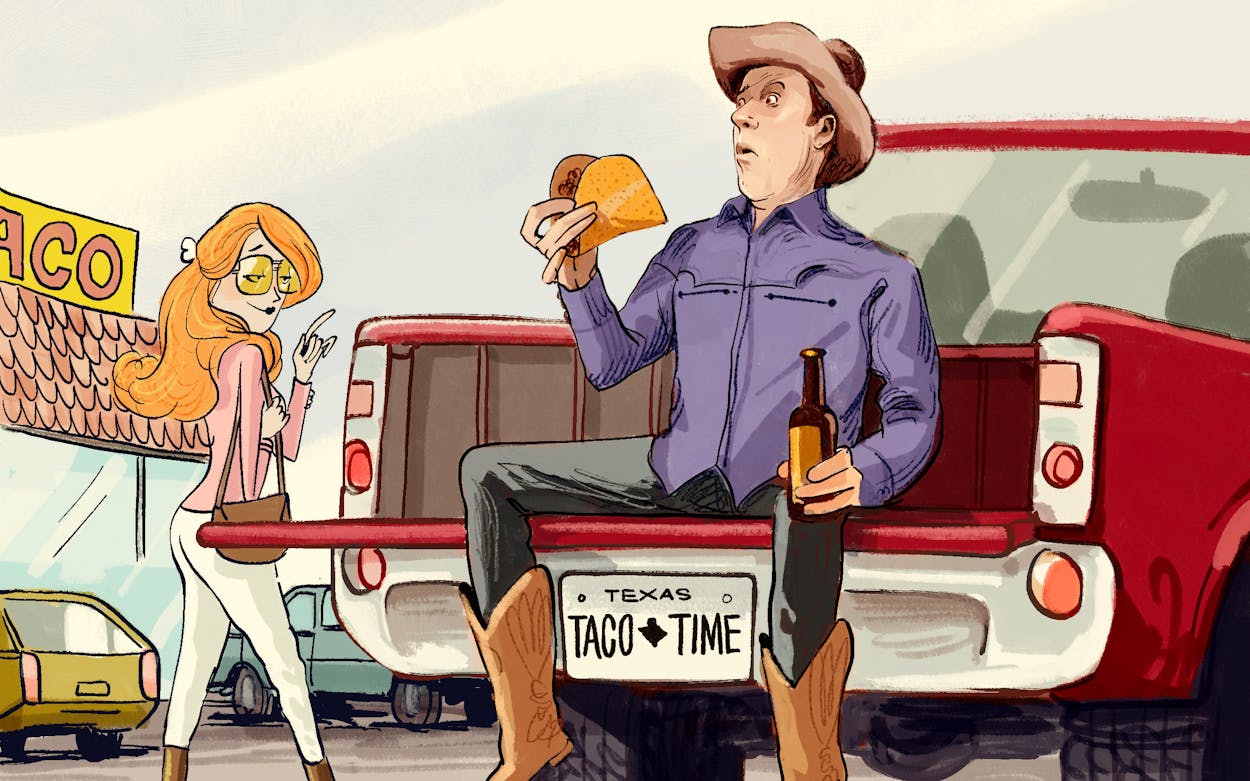Q: I recently came across a newspaper article about personalized Texas license plates that listed some examples of ones that were rejected by the powers that be, and I have to say I was a little confused. What’s wrong with “BBQ*GNG” or “EAT@TACO”? And who decides what gets approved
and what doesn’t?
Puzzled in Port Arthur
A: Is there anything better than motoring along a winding ribbon of beautiful back-road blacktop, the windows rolled down, the fresh country air blowing freely through the cabin while the dulcet tones of, say, Willie Nelson’s “On the Road Again” provide a perfect soundtrack to an afternoon’s carefree meanderings? The Texanist—a man of some worldliness, mind you—thinks not.
Much to the good fortune of all kings and queens of the Texas road, the Lone Star State is a place that is not only endlessly scenic and stocked with a bottomless supply of fresh country air but also blessed with more paved roadway than any other state in the union—more than 650,000 lane miles, in fact, enough to circle the earth 26 times. And once a driver is able to cast off the hurly-burly of the big cities, where clotted traffic is too often the norm, those hundreds of thousands of miles of pavement offer room enough for our 25 million–plus registered vehicles—105,561 of them classified as “farm trucks,” by the way—to happily roam.
In order to legally take advantage of all those thoroughfares, Texans have, since 1907, had to register their vehicles with the state. This requirement was instituted primarily to collect funds that support the building and maintenance of that impressive network of public highways and byways. The license plate serves as proof of such registration.
Over the years, these emblems have changed a bit. Early on, individual counties assigned the plate numbers (alphanumeric sequences weren’t introduced until 1931), and it was left to the owner of each vehicle to decide what material their plate would be made of. According to the historical record, the materials included everything from leather to porcelain to wood. The Texanist imagines that he could have whittled himself quite a dandy.
Alas, beginning in 1917, when the state took upon itself the responsibility for issuing license plates, a certain amount of standardization prevailed. The first state-issued ones (Texas registered 194,720 vehicles that year) were made of sheet iron and featured white numbers on a dark blue background along with the abbreviation “TEX,” which ran vertically down the right side. In the decades since, there have been numerous alterations to the design of the plates and to the materials used to manufacture them. Beginning in 1935, all of Texas’s license plates have been made by prisoners in Huntsville. (Fun fact: in the forties, because of wartime metal shortages, Texas considered making license plates out of a soybean by-product, though this idea was abandoned when it was discovered that livestock found them to be tasty enough to eat.)
The personalized plate, a.k.a. the vanity plate, debuted in Texas with the Legislature’s passage of the Prestige License Plate Act, in 1965. Since that time, for an annual fee (which today is anywhere from $50 to $195) on top of the normal registration fee ($50 or so for most of us), hundreds of thousands of Texans have opted to jazz up their motoring experience by way of such vanity. Nowadays, one can see the results on every street and highway in the state—cars and trucks and trailers and motorcycles sporting such messages as the über-Texan “CMNTKT,” the prideful “PUROTXN,” the eye-catching “U LQQKED,” the mouthwatering “MMMEAT,” and, yes, the purloined “TXN1ST”—which some audacious soul who is definitely not the Texanist has shamelessly claimed.
To gain further insight into this automotive subculture, the Texanist reached out to the Texas Department of Motor Vehicles, the agency charged with overseeing, among other things, automotive registrations. Department spokesperson Adam Shaivitz reported that during the last fiscal year, the DMV received 92,698 applications for personalized license plates, of which 92 percent were approved. The 8 percent that were not approved were denied for a variety of reasons, most of which can be found in Title 43 of the Texas Administrative Code.
The specified portions of the code, as one might expect, largely consist of the sort of bureaucratese that usually sends the Texanist off to sleep. (“The department may cancel any license plate issued with a personalized alphanumeric pattern if the department subsequently determines or discovers that the personalized alphanumeric pattern did not comply with this section when the license plate was issued, or if due to changing language usage, meaning, or interpretation, the personalized alphanumeric pattern no longer complies with this section.”) Still, the Texanist was able to glean that indecent, vulgar, or derogatory language, as well as language that might incite or glorify criminal behavior or encourage the use of narcotics, are among the transgressions that would likely prompt the DMV to slam on the brakes.
Of course, in many cases judgment comes into play. Is “I ♥ GRASS” an innocent paean to frolicking in a meadow or a nefarious reference to the attractions of cannabis? Is “CRZY 4 SX” the motto of a self-admitted horndog or the declaration of a Boston baseball fan who has found herself living far from her native Beantown? Such questions force the staff of the DMV to engage in the sort of exegesis that one might expect to find in the latest issue of Culture, Theory and Critique or at a trivia night hosted by Lone Star Mensa. (Lone Star Mensa’s mascot, by the way, is an armadillo.) “The review process includes everything from reviewing previously approved and declined patterns, reviewing Texas Administrative Code Rule 217.27, calling on our employees’ diverse backgrounds, and conducting any additional research needed,” Shaivitz explained. He also noted that rejections are not necessarily the end of the road and can be appealed.
As for the specific reasoning behind the denial of the two seemingly innocuous examples you reference in your query, Puzzled in Port Arthur, the Texanist, on your behalf, demanded answers. Like you, he had to know what in tarnation could possibly be wrong with “BBQ*GNG” or “EAT@TACO”?
In the case of the former, the Texanist was informed that it boiled down to criterion E of section 2 of section 217.27, which involves “a direct or indirect reference to gangs, illegal activities, implied threats of harm, or expressions that describe, advertise, advocate, promote, encourage, glorify, or condone violence, crime, or unlawful conduct.” Apparently, as if Texas doesn’t have enough to worry about, what with feral hogs, fire ants, and earthquakes, we now have to watch out for a dangerous barbecue “gang” wandering the state, presumably terrorizing innocent diners who have the temerity to splash a little sauce on their brisket. The knee-jerk apprehension exhibited by the DMV upon encountering the jocularly deployed word “gang” in a completely innocent context would surely alarm fans of the old-school hip-hop stylings of the Sugarhill Gang, the vintage comedic stylings of TV’s Our Gang, or the Christian stylings of the Sugar Creek Gang series of children’s books. Fortunately, the Texanist was happy to learn from Shaivitz, “BBQ*GNG” was subsequently approved on appeal. Case closed.
As for “EAT@TACO,” well, the Texanist first suspected that it was rejected for reasons of syntax. “Eat at taco” doesn’t make a lick of sense, and the Texanist wondered if the applicant mistakenly thought that the @ is just another way of writing a, rather than shorthand for “at.” Based on that logic, the Texanist was ready to assent to the DMV’s judgment that a plate this confusing might lead to fender benders perpetrated by befuddled motorists or to road rage on the part of thin-skinned grammar nerds.
But as it turns out, that wasn’t the case at all. “EAT@TACO,” Shaivitz explained, was rejected because of criterion A of section 2 of section 217.27, which pertains to messages that are “indecent (defined as including a direct reference or connotation to a sexual act, sexual body parts, excreta, or sexual bodily fluids or functions).” The Texanist, who has eaten tacos his whole life without realizing that he was engaged in some sort of salacious activity, was bewildered. “Sexual act”? “Sexual body parts”? “Excreta, or sexual bodily fluids or functions”? What in the name of cochinita pibil are these people talking about? It’s carne asada, for land’s sake, not carnal asada! The Texanist found himself shaking with a sudden case of the vapors.
But after he regained his composure, the Texanist engaged in a little googling and discovered the existence of a sophomoric old gag about the, well, visual similarity between a taco and a, um, woman’s, ahem, private parts. He’d never heard the joke before and, to be honest, found it only mildly amusing. Others, apparently, feel otherwise, as one can order a variety of T-shirts, hoodies, tote bags, buttons, pillows, and the like emblazoned with this puerile rib-tickler.
Even so, the Texanist would argue that sometimes—actually, pretty much all the time—a taco is just a taco, especially in a place as teeming with tasty tacos as Texas. Thus, he sincerely hopes the powers that be at the Texas Department of Motor Vehicles will get their minds out of the gutter, reverse course, and offer a prompt apology and a belated approval to that taco-loving, albeit grammatically challenged, applicant.
Until the latter is granted, Puzzled in P.A., keep your hands on the wheel, your feet on the pedals, and your eyes on the road, not on the “TXS TRSH” license plate affixed to the red Tesla two lanes over. And let’s all remember to drive the Texas way, which is to say friendly. As for the Texanist, he’s going to belly up to the bar at his local watering hole for a tall mezcal paloma—and take an Uber home. He’s earned it.
Have a question for the Texanist? He’s always available here. Be sure to tell him where you’re from.
This article originally appeared in the April 2023 issue of Texas Monthly with the headline “The Texanist.” Subscribe today.
- More About:
- The Texanist
- Port Arthur









